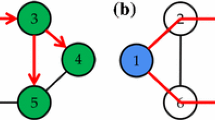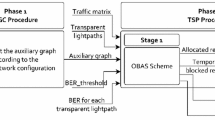Abstract
Optical networks with DWDM (Dense Wavelength Division Multiplex) can provide multiple data channels to supply high speed, high capacity to perform bandwidth-intensive multicast transmission service. Light-tree is a popular technique applied to support point-to-multipoint multicast services. Any failure during a multicast session would cause severe service loss or disruptions, especially when the faults occur near the source node. A novel ring-based local fault recovery mechanism, Multiple Ring-based Local Restoration (MRLR), for point-to-multipoint multicast traffic based on the minimum spanning tree (MST) in WDM mesh networks is proposed in this article. The MRLR mechanism dismembers the multicast tree into several disjoint segment-blocks (sub-trees) and reserves preplanned spare capacity to set up multiple protection rings in each segment-block for providing rapid local recovery. The MRLR scheme outperforms other methodologies in terms of the blocking probability, recovery time, and average hop count of protection path per session for different network topologies.
Similar content being viewed by others

References
Kaminow I.P., et al. (1996). A wideband all-optical WDM network. IEEE Journal on Selected Areas in Communications 14(5): 780–799
Kiniry J.R. (1998). Wavelength division multiplexing: Ultra high speed fiber optics. IEEE Internet Computing 2(2): 13–15
Sahasrabubuddhe L., Mukherjee B. (1999). Light trees: Optical multicasting for improved performance in wavelength routed networks. IEEE Communication Magazine 37(2): 67–73
Ali M., Deogun J. (2000). Allocation of splitting nodes in all-optical wavelength routed networks. Photonic Network Communications 2(3): 247–265
West D.B. (2001). Introduction to graph theory (2nd ed.). New Jersey, Prentice-Hall
Xu, D., Xiong, Y., & Qiao, C. (2002). Protection with multi-segments in networks with shared risk link groups (SRLG), 40th Annual allerton conf. communication, control, and computing (pp. 987–996). Champaign, IL, USA.
Xu D., Xiong Y., Qiao C. (2003). Novel algorithms for shared segment protection. IEEE Journal on Selected Areas in Communications 21(8): 1320–1331
Singhal, N., & Mukherjee, B. (2003). Dynamic provisioning of survivable multicast sessions in optical WDM mesh networks. In: IEEE/OSA OFC’03 (Vol. 1, TuI5). Atlanta, GA, USA (March 2003).
Lee J., Zheng H., Zhou B., Guo Y. (2004). A novel fast multicast algorithm with enhanced survivability in WDM optical networks. Photonic Network Communications 8(2): 223–232
Médard M., Finn S.G., Barry R.A., Gallager G.R. (1999). Redundant trees for preplanned recovery in arbitrary vertex-redundant or edge-redundant graphs. IEEE/ACM Transactions on Networking 7(5): 641–652
Boworntummarat, C., Wuttisittikulkij, L., & Segkhoonthod, S. (2004). Light-tree based protection strategies for multicast traffic in transport WDM mesh networks with multi-fiber systems. In IEEE International Conference on Communications (vol. 3, pp. 1791–1795). Paris, France (June 2004).
Leelarusmee, P., Boworntummarat, C., & Wuttisittikulkij, L. (2004). Design and analysis of five protection schemes for preplanned recovery in multicast WDM networks. In IEEE/Sarnoff Symposium on Advances in Wired and Wireless Communication (pp. 167–170). Princeton, NJ, USA (April 2004).
Singhal N.K., Sahasrabuddhe L.H., Mukherjee B. (2003). Provisioning of survivable multicast sessions against single link failures in optical WDM mesh networks. Journal of Lightwave Technology 21(11): 2587–2594
Fei, A., Cui, J., Gerla, M., & Cavendish, D. (2001). A dual tree scheme for fault tolerant multicast. In IEEE International Conference on Communications, 3, 690–694. Helsinki, Finland (June 2001).
Hwang I.S., Huang I.F., Chien C.C. (2005). A novel dynamic fault restoration mechanism using multiple rings approach in WDM mesh network. Photonic Network Communications 10(1): 87–105
Hwang I.S., Huang I.F., Chien D.C. (2006). Efficient path-segment protection utilizing logical-ring approach in WDM mesh network. IEICE Transactions on Information and Systems 89-D(2): 679–686
Hwang I.S., Huang I.F., Shie J.H. (2007). Pragmatic segment protection employing distributed multiple-ring search in WDM mesh networks. Journal of Information Science and Engineering 23(2): 649–660
Assi C.M., Shami A.A., Ali M.A., Zhang Z., Liu X. (2002). Impact of wavelength converters on the performance of optical networks. Optical Networks Magazine 3(2): 22–30
Chen, S., & Shavitt, Y. (2004). A scalable distributed QoS multicast routing protocol. In IEEE International Conference on Communications (Vol. 2, pp. 1161–1165). Paris, France (June 2004).
Author information
Authors and Affiliations
Corresponding author
Rights and permissions
About this article
Cite this article
Hwang, IS., Cheng, RY. & Tseng, WD. A novel dynamic Multiple Ring-based Local Restoration for point-to-multipoint multicast traffic in WDM mesh networks. Photon Netw Commun 14, 23–33 (2007). https://doi.org/10.1007/s11107-007-0060-7
Received:
Accepted:
Published:
Issue Date:
DOI: https://doi.org/10.1007/s11107-007-0060-7



